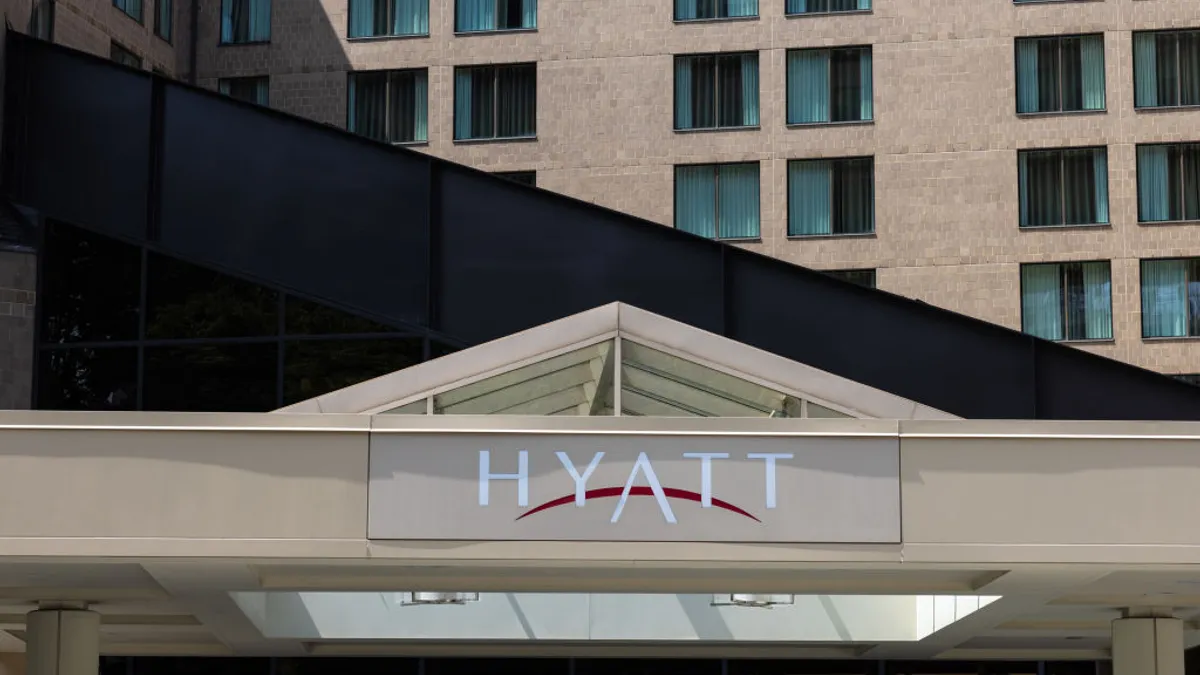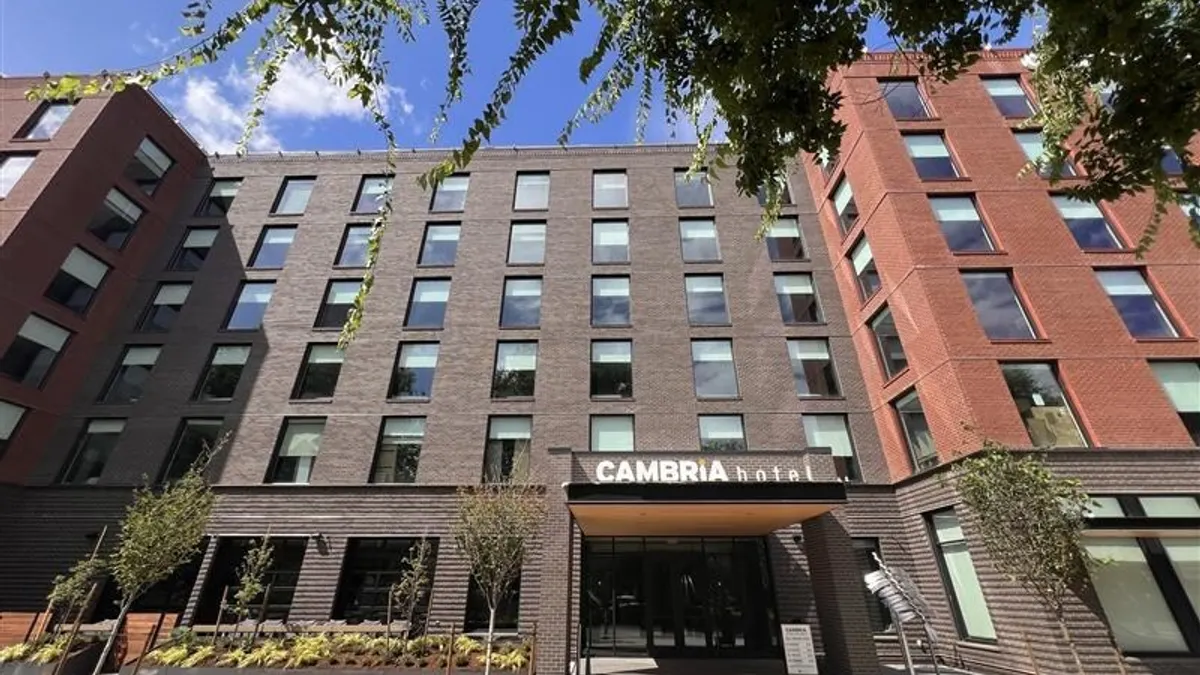The hotel industry was abuzz yesterday after Choice Hotels International announced an official proposal to acquire Wyndham Hotels & Resorts. Wyndham fired back, rejecting the unsolicited offer.
Choice offered $90 per share for all outstanding Wyndham shares, payable in a mix of cash and stock, asserting the deal would provide important benefits to both companies’ shareholders. Wyndham’s Chairman of the Board of Directors, Stephen Holmes, however, rebutted this, calling the offer “underwhelming, highly conditional, and subject to significant business, regulatory and execution risk.”
Choice’s intention to acquire Wyndham was not necessarily a surprise to the industry — first rumblings of the deal were heard in May — but the Maryland-based hotel company’s move to make its correspondence and negotiations with Wyndham public knowledge has led some experts to believe the deal is more likely to close than they originally anticipated.
Experts shared with Hotel Dive their thoughts on Choice’s public offering, Wyndham’s response and how this merger, if it were to happen, could impact the hotel industry at large.
Possible motivations
Choice Hotels’ public proposal to acquire Wyndham is seen by some as a hostile bid.
Dan Wasiolek, a senior equity analyst for Morningstar Research Services who covers lodging, told Hotel Dive that means Wyndham management was not on board with the deal, and Choice made their proposal public anyway, unsolicited by Wyndham.
In the announcement, Choice President and CEO Patrick Pacious said the public proposal comes after the two companies had reached a negotiable range on price and consideration and “shared recognition of the value opportunity this potential transaction represents,” but then Wyndham decided to disengage with negotiations in late September.
By taking the bid public, Choice makes their offering known to Wyndham shareholders and could potentially sway their opinion on the acquisition, Wasiolek said. If Wyndham shareholders are convinced the deal is advantageous enough, he added, they could vote on its approval, essentially skirting Wyndham’s board.
Other industry experts aren’t convinced Choice’s move was hostile in nature, though. Skyler Cooper, a hospitality investment advisor at Marcus & Millichap, said the public offering could simply be an “unconventional” way to keep the deal momentum going.
This aligns with Choice’s assertion that the company made its latest proposal public to continue discussions following nearly six months of negotiations with Wyndham. Along with this statement, Choice stressed that the deal is in the best interest of both companies’ stakeholders, including franchisees, shareholders, associates and guests.
If the merger were to happen, it would create one of the largest budget hotel owners in the country, with nearly 17,000 hotels worldwide.
Additionally, the merged companies would experience increased sales, enhanced distribution and technology, a larger reservation platform and likely a loyalty program currently unmatched globally, Cooper said. Morningstar research shows the merger would combine Wyndham’s more than 100 million loyalty members with Choice’s 60 million, bringing it closer to industry leader Marriott’s, which has 186 million members.
According to Choice, franchisees specifically would benefit from lower total cost of ownership and increased hotel profitability, while shareholders would see “superior value creation,” including annual run-rate synergies estimated at approximately $150 million.
Wyndham’s rejection
Wyndham does not believe the deal poses such weighty benefits, however, and alleges Choice “disingenuously” represented its disengagement from negotiations.
“We are disappointed that Choice's description of our engagement disingenuously suggests that we were in alignment on core terms and omits to describe the true reasons we have consistently questioned the merits of this combination — Choice's inability and unwillingness to address our significant concerns about regulatory and execution risk and our deep concerns about the value of their stock,” Holmes said in the release distributed several hours after Choice took its offering public.
Wyndham’s Board of Directors unanimously rejected the so-called “highly conditional, unsolicited” proposal in the release, saying the proposed transaction involves “significant business and execution risks, including an extended regulatory timeline and uncertainty of outcome, potential franchisee churn, and excessive leverage levels at the pro forma combined company.”
But some of the concerns Wyndham raises, particularly execution risks and excessive leverage, are “not that big of a deal,” according to Wasiolek.
Execution risk, for example, is present in any company integration, and the excessive leverage (or risk from the debt Choice would have to take on to finance the deal) seems insignificant since “these companies draw so much free cash flow,” Wasiolek said.
“[Wyndham] is going to have to convince shareholders that this offer is not in their best interest,” he added.
Undervalued?
Wyndham’s disengagement in the negotiations signals to Wasiolek that the company believes its “standalone value is worth more than what Choice is offering.” And that’s something Wyndham shareholders need to consider as well.
“If I’m a Wyndham shareholder right now, I am interested in what's being offered, but I'm not necessarily saying, ‘Okay, do this deal,’” Wasiolek said.
Cooper agreed that Wyndham’s disengagement in the negotiation process is likely in part due to concerns that the company’s shareholders are being undervalued.
“Who’s to know that there's not another group, another company looking to acquire [Wyndham], and this could be a negotiation tool for [Wyndham] to increase [Choice’s] price or maybe just to ensure that they're not missing something else that might be an interesting opportunity,” Cooper said.
Wasiolek also considered the possibility that another hotel company could be eyeing Wyndham.
If Marriott or Hilton, the two largest hotels by revenue share, were to acquire Wyndham, it would “make a ton of sense because that would fill up their price points,” Wasiolek said.
“Marriott and Hilton already have luxury, upscale and some midscale, but they don't really have economy, and they could use more midscale, and Wyndham would give them that,” he said.
“But the problem is from a regulatory standpoint,” he added. “InterContinental is the number-three player for revenue share, [and] a company like InterContinental has the financial ability to acquire [Wyndham] and also the regulatory runway to get the approval for that to happen.”
It’s unclear if any of these companies are actually considering this acquisition, but Choice’s public proposal to buy Wyndham has made the company a significantly more attractive investment regardless, Wasiolek said.
“I think Choice making this public has now shown investors that [it] values Wyndham much higher than what the market was valuing it yesterday,” he added. “Here's [Wyndham’s] main peer saying, ‘We agree that it was undervalued, and we thought it should be valued at least at this.’ That news is out, and now that it’s out, you can't put the cat back in the bag. So that's a good thing for Wyndham shareholders. I think it puts a level of support underneath shares.”
As of Tuesday afternoon, Wyndham’s stock was up 7.2%, while Choice’s shares lowered by 5.3%.


















